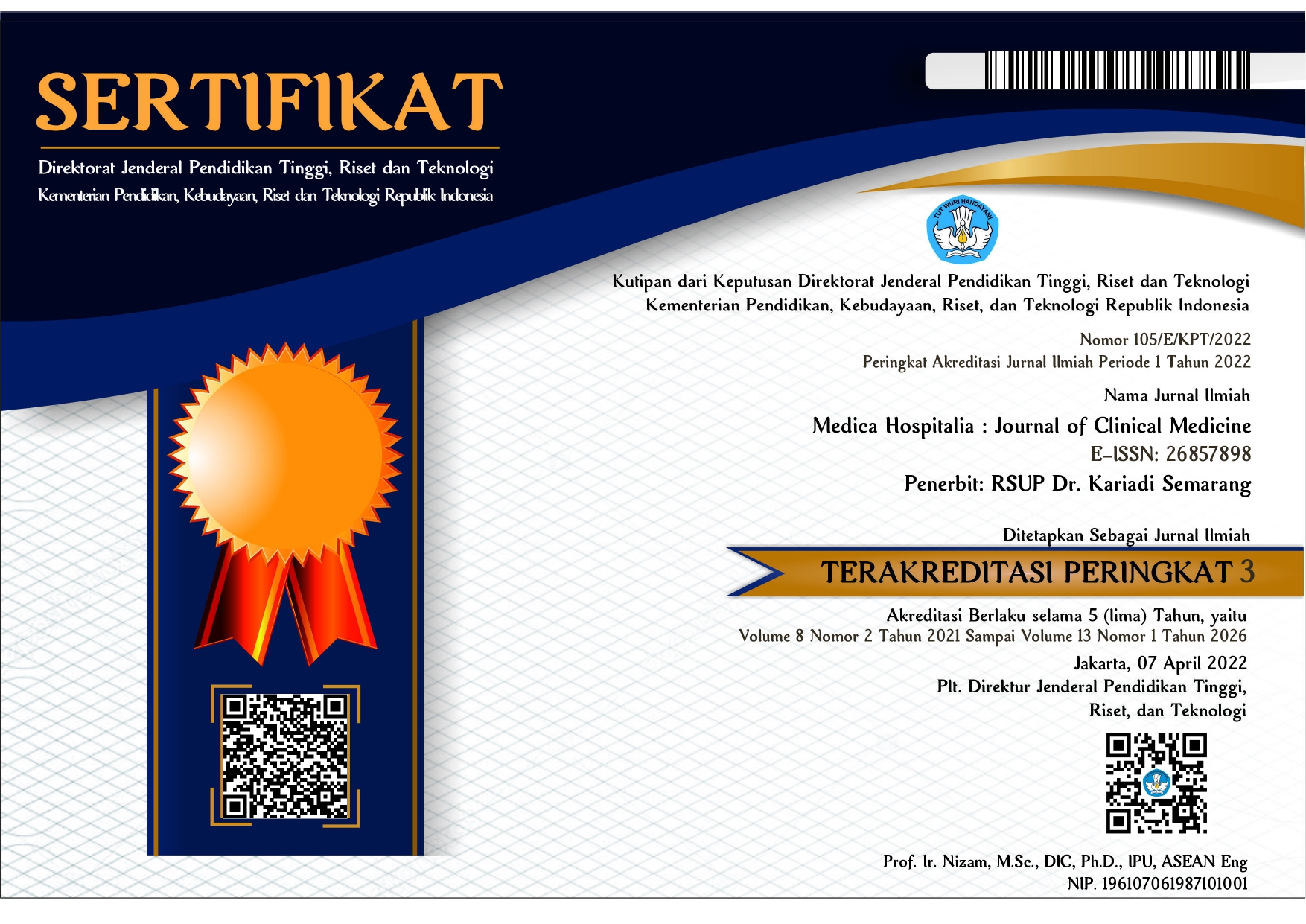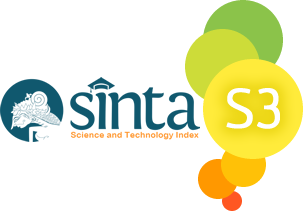The Effect of 1% Povidone Iodine Mouthwash on The Incidence of Oral Mucositis and Odynophagia in Patients with Head and Neck Malignancy
DOI:
https://doi.org/10.36408/mhjcm.v10i2.854Keywords:
oral mucositis, povidone iodine 1%, odynophagia, head and neck malignancyAbstract
BACKGROUND: Oral mucositis is an injury of normal mucosal tissue with an acute inflammation of the oral, tongue, and pharyngeal mucosa after exposure to chemo-radiotherapy. Post chemoradiotherapy oral mucositis is commonly accompanied by painful swallowing or odynophagia. Povidone iodine 1% is an antiseptic mouthwash that widely used to prevent infections in the oral cavity.
OBJECTIVE: The aim of this study was to determine the effect of 1% povidone iodine mouthwash on the incidence of oral mucositis in patients with head and neck malignancy at Dr. Kariadi General Hospital Semarang.
METHOD: This study was single random blinded experimental study, with total samples of 44 patients with head and neck malignancy after chemoradiotherapy. The samples divided into treatment group of 22 samples with 1% povidone iodine mouthwash and control group of 22 samples with NaCl 0.9% recruited using single random sampling at Dr. Kariadi Semarang General Central Hospital in 2022. The effect of 1% povidone iodine mouthwash on the incidence of oral mucositis and odynophagia was analyzed using the Fischer Exact and Mann Whitney test.
RESULT: In the 1% povidone iodine mouthwash group day 15th, 21 patients (95.5%) were found without mucositis and 1 patient (4.5%) with mucositis oral grade I. In the 1% povidone iodine mouthwash group, 21 people (4.5%) were found without odynophagia and 1 people (4.5%) had odynophagia. There was an association between oral mucositis and odynophagia on povidone iodine 1% group (p < 0.05).
CONCLUSION: Povidone iodine 1% mouthwash can affect the incidence of oral mucositis in patients with head and neck carcinoma. Povidone iodine 1% mouthwash can reduce the incidence of oral mucositis and odynophagia compared to placebo in patients with head and neck carcinoma.
Downloads
References
1. Sinha S, Gajra A. Nasopharyngeal Cancer. In: StatPearls. Treasure Island (FL): StatPearls Publishing; July 12, 2022 [cited February 17, 2023]. Available from: https://pubmed.ncbi.nlm.nih.gov/29083686/
2. Simon J, Schroeder L, Ingarfield K, Diehl S, Werner J, Brenner N, et al. Epstein-Barr virus and human papillomavirus serum antibodies define the viral status of nasopharyngeal carcinoma in a low endemic country. International Journal of Cancer. 2020;147(2):461–71. doi: 10.1002/ijc.33006.
3. Adoga AA, Kokong DD, Ma’an ND, Silas OA, Dauda AM, Yaro JP, et al. The epidemiology, treatment, and determinants of outcome of primary head and neck cancers at the Jos University Teaching Hospital. South Asian Journal of Cancer. 2018;7(3):183.
4. Li PJ, Li KX, Jin T, Lin HM, Fang JB, Yang SY, et al. Predictive Model and Precaution for Oral Mucositis During Chemo-Radiotherapy in Nasopharyngeal Carcinoma Patients. Frontiers in Oncology. 2020; 10: 1-11. doi:10.3389/fonc.2020.596822
5. Zhu XX, Yang XJ, Chao YL, Zheng HM, Sheng HF, Liu HY, et al. The Potential Effect of Oral Microbiota in the Prediction of Mucositis During Radiotherapy for Nasopharyngeal Carcinoma. EBioMedicine. 2017; 18: 23–31. doi:10.1016/j.ebiom.2017.02.002
6. Pulito C, Cristaudo A, Porta CL Zapperi S, Blandino G, Morrone A, et al. Oral mucositis: the hidden side of cancer therapy. J Exp Clin Cancer Res. 2020: 39(210): 1-15 https://doi.org/10.1186/s13046-020-01715-7
7. Ingrosso G, Saldi S, Marani S, Wong AYW, Bertelli M, Aristei C, et al. Breakdown of Symbiosis in Radiation-Induced Oral Mucositis. J. Fungi. 2021: 7(290): 1-14. https://doi.org/10.3390/jof7040290
8. Maria OM, Eliopoulos N, Muanza T. “Radiation-Induced Oral Mucositis”. Frontiers in oncology. 2020; 7(89): 1-23. https://doi.org/10.3389/fonc.2017.00089
9. Kim DH, Park JS. The Effect of Saline Gargling on Dry Mouth and Sore Throat in Patients with Thyroidectomy. Asian Oncol Nurs. 2020; 20(4): 160-170. http://doi.org/10.5388/aon.2020.20.4.160
10. Kanagalingam J, Feliciano R, Hah JH, Labib H, Le TA, Lin JC, et al. Practical use of povidone‐iodine antiseptic in the maintenance of oral health and in the prevention and treatment of common oropharyngeal infections. International Journal of Clinical Practice. 2015;69(11):1247-1256. doi: 10.1111/ijcp.12707.
11. Madan KPD, Sequeira PS, Shenoy K, Shetty J. The effect of three mouthwashes on radiation-induced oral mucositis in patients with head and neck malignancies: A randomized control trial. J Can Res Ther. 2008; 4(1): 3-8. doi: 10.4103/0973-1482.39597
12. Vokurka S et al. “The comparative effects of povidone-iodine and normal saline mouthwashes on oral mucositis in patients after high-dose chemotherapy and APBSCT--results of a randomized multicentre study”. Support Care Cancer. 2005; 13(7) : 554-8. doi: 10.1007/s00520-005-0792-9.
13. Chen SC. Oral Dysfunction in Patients With Head and Neck Cancer: A Systematic Review. The Journal of Nursing Research. 2019; 27(6): 1-14. doi: 10.1097/jnr.0000000000000363.
14. Wu L, Li C, Pan L. Nasopharyngeal carcinoma: A review of current updates. Experimental and therapeutic medicine. 2018; 15(4). 3687–3692. https://doi.org/10.3892/etm.2018.5878
15. Komite Penanggulangan Kanker Nasional. Pedoman Nasional Pelayanan Kedokteran Kanker Nasofaring. Kementerian Kesehatan Republik Indonesia. 2017: 2-89. http://kanker.kemkes.go.id/guidelines/PNPKKNF.pdf
16. Palmieri M, Sarmento DJS, Falcão AP, Martins VAO, Brandão TB, Morais-Faria K et al. Frequency and Evolution of Acute Oral Complications in Patients Undergoing Radiochemotherapy Treatment for Head and Neck Squamous Cell Carcinoma. Ear Nose Throat J. 2021; 100(5_suppl): 449S-455S. doi:10.1177/0145561319879245
17. Mallick S, Benson R, Rath GK. Radiation induced oral mucositis: a review of current literature on prevention and management. Eur Arch Otorhinolaryngol. 2016; 273(9): 2285-2293. doi:10.1007/s00405-015-3694-6
18. Elad S, Cheng KKF, Lalla RV, Yarom N, Hong C, Logan RM, et al. MASCC/ISOO clinical practice guidelines for the management of mucositis secondary to cancer therapy. Cancer. 2020; 126(19): 4423–4431. doi:10.1002/cncr.33100
19. Mercadante S, Aielli F, Adile C, Ferrera P, Valle A, Caruselli A, et al. Prevalence of oral mucositis, dry mouth, and dysphagia in advanced cancer patients. Support Care Cancer. 2015; 23(11): 3249-3255. doi:10.1007/s00520-015-2720-y
20. Cristofaro MG, Barca I, Ferragina F, Novembre D, Ferro Y, Pujia R, et al. The health risks of dysphagia for patients with head and neck cancer: a multicentre prospective observational study. J Transl Med. 2021; 19(472): 1-8. doi:10.1186/s12967-021-03144-2
Additional Files
Published
How to Cite
Issue
Section
Citation Check
License
Copyright (c) 2023 Peny Handayani

This work is licensed under a Creative Commons Attribution-ShareAlike 4.0 International License.
Copyrights Notice
Copyrights:
Researchers publishing manuscrips at Medica Hospitalis: Journal of Clinical Medicine agree with regulations as follow:
Copyrights of each article belong to researchers, and it is likewise the patent rights
Researchers admit that Medica Hospitalia: Journal of Clinical Medicine has the right of first publication
Researchers may submit manuscripts separately, manage non exclusive distribution of published manuscripts into other versions (such as: being sent to researchers’ institutional repository, publication in the books, etc), admitting that manuscripts have been firstly published at Medica Hospitalia: Journal of Clinical Medicine
License:
Medica Hospitalia: Journal of Clinical Medicine is disseminated based on provisions of Creative Common Attribution-Share Alike 4.0 Internasional It allows individuals to duplicate and disseminate manuscripts in any formats, to alter, compose and make derivatives of manuscripts for any purpose. You are not allowed to use manuscripts for commercial purposes. You should properly acknowledge, reference links, and state that alterations have been made. You can do so in proper ways, but it does not hint that the licensors support you or your usage.

























